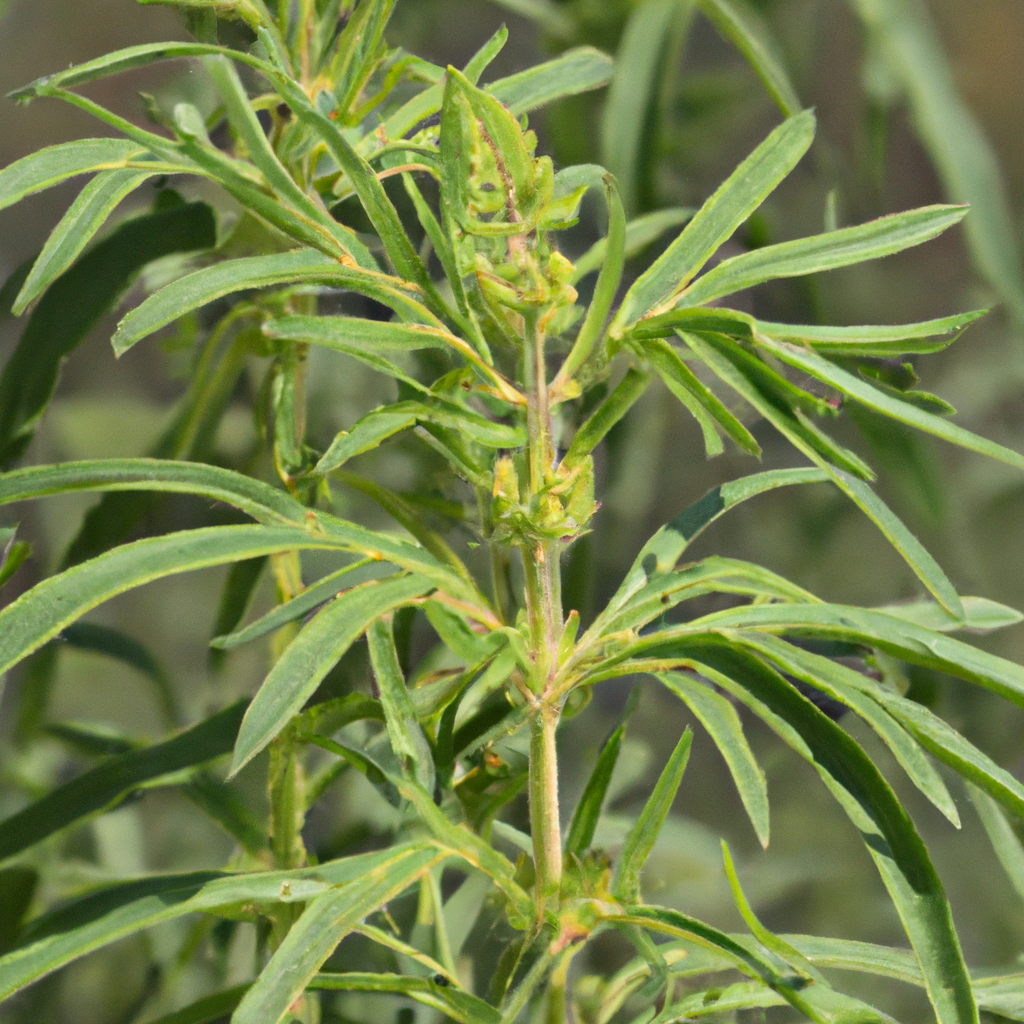Biological Name:
Ambrosia spp. (Ragweed)
Natural Habitat:
Ragweed is a plant with small, inconspicuous flowers and leaves that are divided into lobes. It is a common allergy-causing weed and is found in many parts of the world.
Description:
Ragweed is a tall annual weed with deeply-lobed leaves and small greenish-yellow flowers. It is commonly found in fields roadsides and other areas with disturbed soil.
Frequently Asked Questions (FAQs)
Q: What time of year does ragweed cause allergies?
A: Ragweed starts pollinating as early as July in some states, especially states in the South. But for most of the country, it appears in August and peaks in mid-September. Ragweed pollen can stick around as late as November, depending on where you live.
Source
Q: What does an allergy to ragweed feel like?
A: The pollen from ragweed causes allergy symptoms in many people. These symptoms include sneezing, runny or stuffy nose, and itchy throat.
Source
Q: What can I take for ragweed allergy?
A: Antihistamines: These medications help relieve allergy symptoms by blocking the release of histamines. OTC antihistamine options include Allegra, Claritin and Zyrtec. Nasal steroids: These medications help reduce inflammation in the nasal passages. OTC nasal steroid options include Flonase and Nasacort.
Source
Q: Is ragweed worse at night?
A: For example, ragweed pollen was found to be 60% higher during the night than during the day. The FDA, in material it provides about allergy relief, also states that during the ragweed season of late summer and early fall, pollen levels are the highest in the evening hours.
Source
Q: What foods are related to ragweed?
A: artichoke.banana.chamomile.cucumber.echinacea.mango.melon (watermelon, cantaloupe, honeydew)sunflower seed.
Source
Q: Does ragweed allergy make you tired?
A: The Quick Answer: Yes, Allergies Can Cause Fatigue This can cause your system to feel overworked and weakened, which can leave your body exhausted. These same chemicals, called histamines, cause the inflammation and irritation that bring on annoying allergy symptoms.
Source
Q: Why are so many people allergic to ragweed?
A: In people with ragweed allergies, the immune system mistakes ragweed pollen as a dangerous substance. This causes the immune system to produce chemicals that fight against the pollen, even though it’s harmless. The reaction leads to a variety of irritating symptoms, such as sneezing, running nose, and itchy eyes.
Source
Q: What is the best thing to take for ragweed allergies?
A: Treat Ragweed Allergies For most people with frequent symptoms, nasal steroids are the best treatment. If your symptoms are more mild, an oral antihistamine may be enough. Both are available over-the-counter.
Source
Q: What medicine is best for ragweed allergy?
A: Antihistamines: These medications help relieve allergy symptoms by blocking the release of histamines. OTC antihistamine options include Allegra, Claritin and Zyrtec. Nasal steroids: These medications help reduce inflammation in the nasal passages. OTC nasal steroid options include Flonase and Nasacort.
Source
Q: How do I know if I am allergic to ragweed?
A: Your allergist can confirm a diagnosis with a skin test — applying a diluted allergen to the surface of your skin and waiting about 15 minutes to see if there is a reaction, such as a raised red bump that itches. Ragweed allergies can be treated with antihistamines and other allergy medications.
Source
Q: How can you tell if you’re allergic to ragweed?
A: Sneezing.Stuffy or runny nose.Itchy eyes, nose and throat.Itchy or puffy eyes.Mucus in the throat (postnasal drip)
Source
Q: What foods are related to ragweed allergy?
A: artichoke.banana.chamomile.cucumber.echinacea.mango.melon (watermelon, cantaloupe, honeydew)sunflower seed.
Source
Q: Why are ragweed allergies worse at night?
A: While pollen counts tend to be higher in the morning, it can also cause nighttime allergies. Warm temperatures push pollen into the air, but cooler evening air means that pollen falls back down to cover outdoor surfaces at night.
Source
Q: How long does ragweed allergies last?
A: A ragweed plant only lives one season, but it packs a powerful punch. A single plant can produce up to 1 billion pollen grains. These grains are very light weight and float easily through the air. Fall allergy symptoms used to start in mid-August and run through September.
Source
Q: What foods make ragweed allergy worse?
A: OAS occurs because your immune system confuses ragweed pollen with certain foods. Common OAS symptoms include itchy mouth, throat, tongue or face….If you have a ragweed allergy, you may also get symptoms when you eat these foods:Banana.Cantaloupe.Cucumber.Honeydew.Watermelon.White potato.Zucchini.Sunflower seeds.Ragweed Pollen Allergy | AAFA.orgwww.aafa.org › ragweed-pollenwww.aafa.org › ragweed-pollen
Source
Q: What months are ragweed?
A: Fall: August – November August 15 is endearingly referred to amongst allergists as the start of ragweed season.
Source
Q: How do you get rid of ragweed allergies?
A: For most people with frequent symptoms, nasal steroids are the best treatment. … Early treatment. … Allergy shots, which can — over the course of months or years — get your body to develop a tolerance to ragweed so it no longer triggers an allergic reaction.
Source
Q: What time of day is ragweed highest?
A: Ragweed plants usually grow in rural areas as well as in urban waste places. Near the plants, pollen levels are highest shortly after dawn. The amount of airborne pollen peaks in many urban areas between 10:00 a.m. and 3:00 p.m., depending on the weather.
Source
Q: Are ragweed allergies worse at night?
A: For example, ragweed pollen was found to be 60% higher during the night than during the day. The FDA, in material it provides about allergy relief, also states that during the ragweed season of late summer and early fall, pollen levels are the highest in the evening hours.
Source
Q: Are ragweed poisonous?
A: It is not poisonous to handle, but of course many people are troubled in late summer with allergies to ragweed pollen. Just pull the plants out when you see them if they cause problems. Giant ragweed is recognizable by its three or five lobed leaves and stems covered with white hairs.
Source
Q: How do ragweed allergies make you feel?
A: The pollen from ragweed causes allergy symptoms in many people. These symptoms include sneezing, runny or stuffy nose, and itchy throat.
Source
Q: What foods contain ragweed?
A: artichoke, banana, chamomile, cucumber, echinacea, mango, melon (watermelon, cantaloupe, honeydew) sunflower seed.
Source
Q: What foods cross react with ragweed?
A: Allergies to certain pollens are associated with OAS reactions to certain foods. For instance, an allergy to ragweed is associated with OAS reactions to banana, watermelon, cantaloupe, honeydew, zucchini, and cucumber.
Source
Q: Why does ragweed make you tired?
A: Overworked Immune System If your body continues to be exposed to the irritant, your immune system will keep working in overdrive. This can make your body tired and also weaken your immune system, which can make you more vulnerable to other illnesses.
Source
Q: Where is ragweed most commonly found?
A: Usually, ragweed plants grow in fields, gardens, waste areas and on roadsides all over the USA, but they’re most common in the eastern and midwestern states.
Source
Q: What is the best way to get rid of ragweed?
A: As a result, regular mowing at a height of 3 to 4 inches is one of the best ways to control ragweed in your lawn, and flower beds are along with improving soil fertility with a fertilizer application. This will create a healthy, nutrient-rich soil which can make it difficult for ragweed to re-establish.
Source
Q: How does ragweed make you feel?
A: The pollen from ragweed causes allergy symptoms in many people. These symptoms include sneezing, runny or stuffy nose, and itchy throat.
Source
Q: What is another name for ragweed?
A: Other common names include bursages and burrobrushes. The genus name is from the Greek ambrosia, meaning “food or drink of immortality””. Ragweed pollen is notorious for causing allergic reactions in humans specifically allergic rhinitis.
Source

